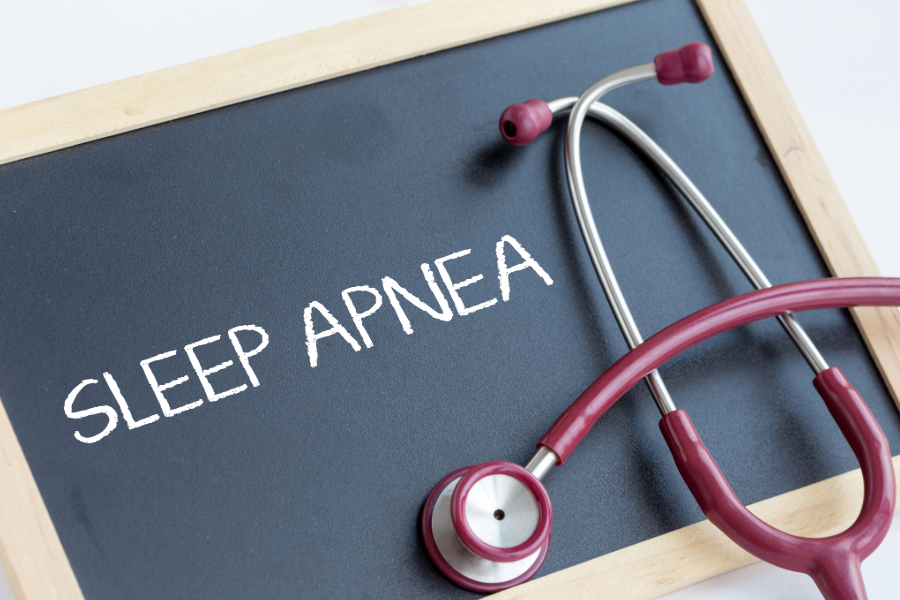How treating sleep apnea can protect your teeth and gums
Posted on November 6, 2025 in Healthy You

Sleep apnea not only affects your sleep but can also harm your oral health. If you’ve been waking up with dry mouth or jaw pain, sleep apnea may be the root cause. Here, we explain how sleep apnea can affect your oral health and what you can do about it.
A quick look at sleep apnea
Sleep apnea is a type of sleep disorder that causes interrupted breathing during sleep. The breaks in your breathing are called “apneas,” and they last from only a few seconds to up to a minute each. Obstructive sleep apnea (OSA) is the most common form of sleep apnea.1 This type of sleep apnea occurs when your throat muscles overrelax and your tongue falls on your airway during sleep, which causes your airflow to be blocked. In addition to causing snoring and poor sleep quality, sleep apnea can cause major health problems, like stroke and cardiovascular disease, when it’s not treated.2
Oral health symptoms related to sleep apnea
People with sleep apnea can experience several oral health-related problems, including:
- Dry mouth: When your airway is blocked during sleep, you may start mouth breathing. Mouth breathing can lead to dry mouth, which occurs when there is a drop in saliva production. Saliva helps clear away harmful bacteria in your mouth, so dry mouth raises your risk of cavities, gum disease and bad breath.
- Teeth grinding: Many people with OSA grind their teeth at night without even realizing it, sometimes as an instinctive way to reopen their airway. Over time, this can wear down enamel and cause jaw problems.
- Temporomandibular joint (TMJ) disorders: The jaw tension from grinding can lead to jaw pain, popping sounds, headaches and difficulty chewing.3
Your dentist may be the first to spot sleep apnea
You might have sleep apnea and not even know it. Your dentist may be the first person to spot some telltale sleep apnea signs that can help get you diagnosed.
Seeing your dentist every 6 months gives you more than just a deep dental cleaning. These are preventive visits, meaning your dentist is looking in and around your mouth for any problems. When you see your dentist twice a year, it increases the chances that your dentist will catch any issues early on.
When it comes to sleep apnea, your mouth can reveal subtle signs that might only be noticed by your dentist. Things like a tongue with wavy indents around the sides or worn down teeth from grinding are signs that might prompt your dentist to ask about your sleep habits and potentially refer you to a sleep specialist who can help you get proper treatment.
Treating sleep apnea
The most commonly prescribed sleep apnea treatment is continuous positive airway pressure (CPAP).2 A CPAP machine keeps your airway open using pressurized air sent through a tube that is connected to a mask that you wear during sleep.
Another treatment for sleep apnea is an oral appliance. Oral appliances can be used with CPAP or used alone for people who can’t use a CPAP machine.
There are two types of oral appliances for sleep apnea: mandibular advancement devices (MADs) and tongue-stabilizing devices (TSDs). Your dentist can recommend the right one for you.
An oral appliance is a snug, custom-fitted device that gently moves your jaw or tongue to keep your airway open. When properly fitted and regularly checked by your dentist, these devices can reduce mouth breathing and grinding, and improve your sleep.
Better sleep, healthy mouth: What you can do now
- Talk to your dentist: If you notice dry mouth, grinding or jaw pain, especially if you also snore or feel sleepy during the day, give your dentist a call.
- Get properly diagnosed: Your dentist may refer you to a sleep medicine specialist so you can get a sleep apnea diagnosis.
- Get the right treatment: Whether it’s CPAP, oral appliance therapy or a combination, getting on the right treatment is essential.
- Keep twice yearly dental checkups: These visits will help safeguard your oral health and catch any potential issues before they become major problems.
Sleep and oral health are more connected than you might think. Treating one often benefits the other. So, if you notice symptoms, don’t hesitate to talk to your dentist. They’ll get you on the right path toward better sleep and better health.
REFERENCES:
- American Dental Association
- Touro College of Dental Medicine
- University General Dentists
SOURCES:
Rutgers
Cleveland Clinic